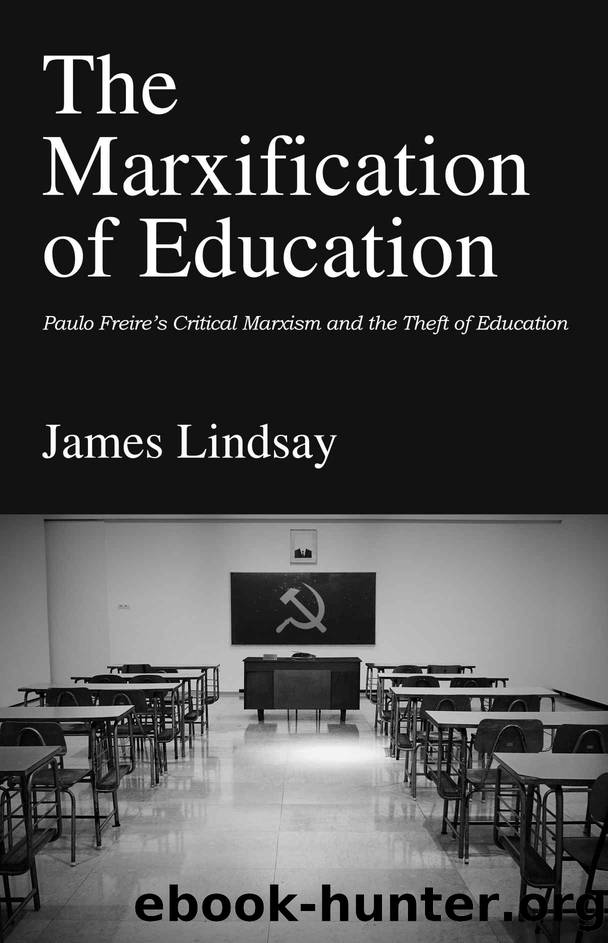The Marxification of Education: Paulo Freire's Critical Marxism and the Theft of Education by Lindsay James

Author:Lindsay, James [Lindsay, James]
Language: eng
Format: epub
ISBN: 9798355360269
Publisher: New Discourses
Published: 2022-12-06T00:00:00+00:00
Freireâs development attempts to bridge the gap, first by drawing on the half century of Critical Marxist thought (critical consciousness) and then introducing an intermediate stage of pure destruction and blind hope, what Iâve termed âutopian consciousness.â His solution, which he designed by taking cues from what he imagined was going on under Mao in the Chinese Cultural Revolution (which he praised) and that he romanticized in Che Guevara, isnât much of a solution. Itâs to re-conscientize over and over again and have permanent, perpetual cultural revolution⦠until it works.
In Freirean pedagogy, walking people through this process of conscientization at least to critical consciousness, if not utopian consciousness, is what replaces learningâit gives the âpolitical literacyâ that replaces literacy (which is, in turn, viewed as a bourgeois and colonialist perversion of education). What this means, though, is ultimately that the education isnât just teaching Marxism but is also engaging in Marxist thought reform , which is another way of putting cult programming or grooming .
The goal of Freirean (that is, ultimately, Woke) Marxism is to create and retain cultists who have been groomed to think like cultists in Freireâs Woke Marxist cult. Its âhopeâ exists in believing that no society actually functions at all until the Utopia finally emerges out of perpetual ashes, but this is possible through relentless criticism of any society that attempts to establish itself. The method is Freireâs perversion of education into this type of thought reform, which is described in the subsequent sections. The ability to do this is greatly enhanced by the Freirean Marxification of education itself, and this is much of why Paulo Freire proves such a pivotal figure in the theory and practice of education.
Thereâs a great deal going on here all at once. First, since itâs based on a Marxist Theory of Knowing, genuine knowledge isnât worth much in a Freirean world. Excluded knowledge is to be privileged because it has been excluded, even if itâs wrong, especially if itâs useful as an activist wrecking ball to the existing society or even the new one activism produces. Second, unlike other Marxist States, which need engineers, doctors, scientists, lots of bureaucrats, and other professionals to make them work until they achieve success and global dominance, Freireâs program has no use for such things. It only needs educators and guerrillas because its objective is not to build or establish a functioning society but instead to free men from any such thing.
Of note, a Marxist Theory of Knowing replicates and scales in a way that no other strain of Marxist thought can. Any field or domain of thought, from education to physics, from medicine to rock climbing, from economics to environmental science, from food science to theology, can be immediately flung into a Marxist conflict model by claiming that domain of thought unjustly recognizes certain privileged knowledges, knowers, and ways of knowing while excluding and marginalizing others to its own benefit. This is its great strength. Its great weakness is that it necessarily must
Download
This site does not store any files on its server. We only index and link to content provided by other sites. Please contact the content providers to delete copyright contents if any and email us, we'll remove relevant links or contents immediately.
Spare by Prince Harry The Duke of Sussex(5154)
Navigation and Map Reading by K Andrew(5135)
Tuesdays with Morrie by Mitch Albom(4741)
Machine Learning at Scale with H2O by Gregory Keys | David Whiting(4270)
Cracking the GRE Premium Edition with 6 Practice Tests, 2015 (Graduate School Test Preparation) by Princeton Review(4255)
Never by Ken Follett(3898)
Goodbye Paradise(3780)
What It Really Takes to Get Into Ivy League and Other Highly Selective Colleges by Hughes Chuck(3720)
Harry Potter and the Prisoner of Azkaban (Book 3) by J. K. Rowling(3331)
Fairy Tale by Stephen King(3321)
Pledged by Alexandra Robbins(3155)
Kick Ass in College: Highest Rated "How to Study in College" Book | 77 Ninja Study Skills Tips and Career Strategies | Motivational for College Students: A Guerrilla Guide to College Success by Fox Gunnar(3104)
A Dictionary of Sociology by Unknown(3054)
Sapiens and Homo Deus by Yuval Noah Harari(3043)
Reminders of Him: A Novel by Colleen Hoover(3040)
The Social Psychology of Inequality by Unknown(2999)
Graduate Admissions Essays, Fourth Edition: Write Your Way into the Graduate School of Your Choice (Graduate Admissions Essays: Write Your Way Into the) by Asher Donald(2891)
Will by Will Smith(2883)
Zero to Make by David Lang(2762)
